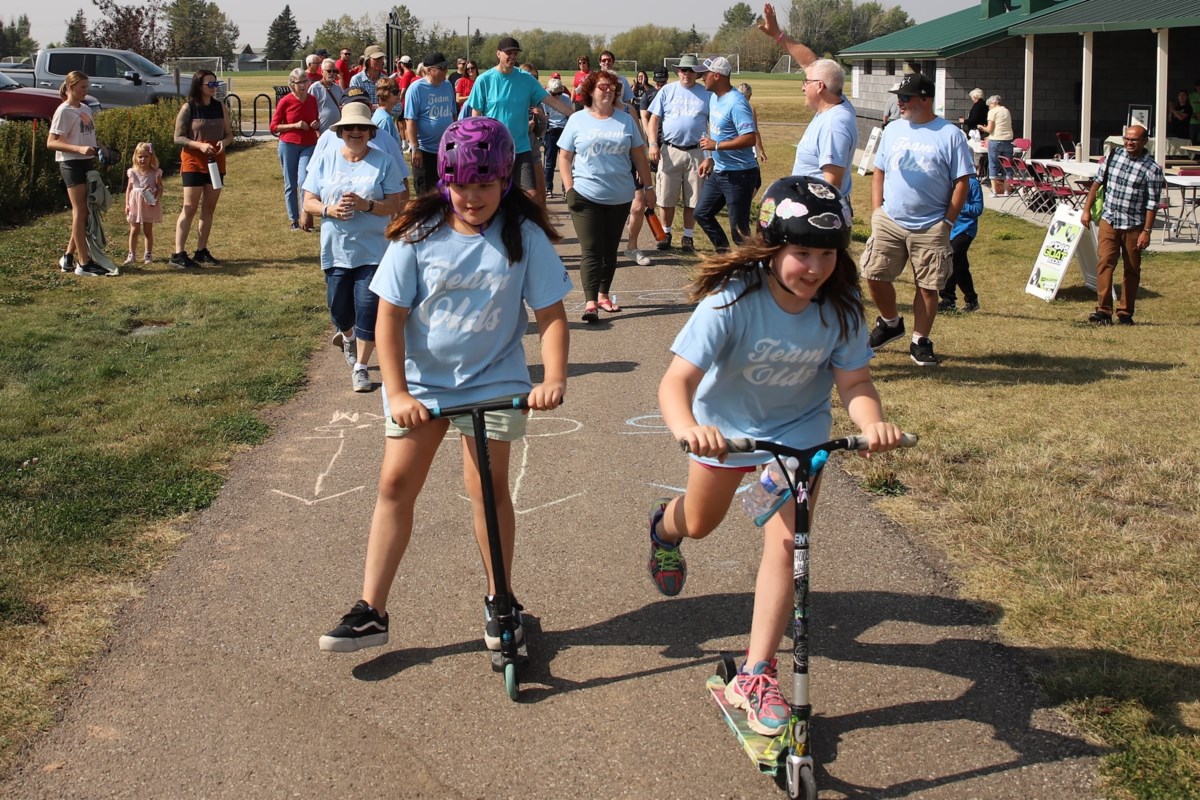
OLDS — About 60 people came out for the first-ever Olds Step ‘n Stride event to raise funds for and awareness about Parkinson disease and Parkinson’s plus syndromes Saturday, Sept. 6 at Rotary Athletic Park.
By the end of the day, an interim total of just over $7,300 had been raised.
The group has participated in some events in Red Deer but hope to conduct the Olds one annually.
Parkinson’s disease is a progressive neurological disease. Symptoms include tremors, rigidity and instability of posture.
Parkinson’s plus syndromes (also called atypical parkinsonism) display symptoms like Parkinson’s.
Symptoms of those conditions include stiffness or loss of coordination and balance as well as changes in speech. Other symptoms include a form of dementia, difficulty in walking, as well as issues with eye movement and swallowing,
A website says Parkinson disease and atypical parkinsonism affects more than one in 500 people across Canada, and more than 15,000 Albertans.
Saturday’s event was not only a fundraiser, but a chance for people to socialize, be active, and learn more about Parkinson’s disease and Parkinson’s plus syndromes.
People signed up and donated to the cause, then gathered for a lunch of sandwiches, carrots and drinks.
Then they were treated to a boxing demonstration because there’s a connection between Parkinson’s and boxing, event organizer Dennis Thompson says.
After that, the walk was held. Routes for different lengths were laid out. Later in the afternoon, raffle tickets were pulled for prizes.
Boxing helps with “balance, coordination, cognitive ability, connecting both sides of the brain, working on both sides of the body, coordination and exercise,” Thompson said during an interview with the Albertan.
“What happens with exercise is it, releases dopamine in the system, which controls the movement of muscles and the thing with memory and mood, that kind of stuff, and it really helps Parkinson’s individuals just kind of improve overall. The longer you do it, the better that connection gets.”
“When we’ve visited the folks in Red Deer, we’ve seen folks who were wheelchair-bound who were actually able to get up and stand on their own and go through the motions of the different punches and boxing.
“It’s not that they can leave their wheelchairs and walk any great distance, but they’re able to stand and perform the movements and do the exercises.
“They have to use their wheelchairs again for any long-range kind of thing, but it does improve to the point where they can move for short distances where they couldn’t do that before.”
Thompson’s wife Laurie was diagnosed with Parkinson’s Disease in 2016, but Thompson said the family began noticing symptoms as far back as about 2010.
Thompson said he hasn’t yet seen improvements in his wife, but they’ve only been in the boxing program for four to five weeks.
Overall, Dennis said he and Laurie are doing well.
“Like she says, ‘I have Parkinson’s but Parkinson’s doesn’t have me,’” he said.
Thompson noted that an Olds and area Parkinson’s support group meets at the Royal Canadian Legion Branch 105 on the second Tuesday of the month, at 1:30 p.m.
He said the size of that support group ranges from about a dozen to more than 30.
“It just depends on the day, and whether or not they’re mobile that day,” he said.


